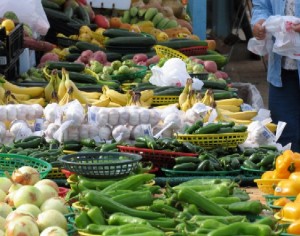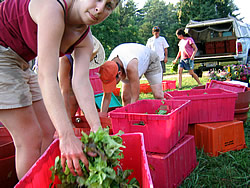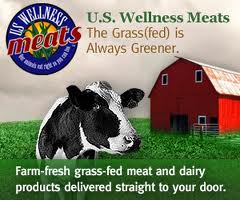-
Mar22
Where to Buy Organic Food for Cheap
Filed under: Stress & Lifestyle;16 Comments




 by
by 
 I’m not going to sugar coat this because this is something that is more important than most people realize.
I’m not going to sugar coat this because this is something that is more important than most people realize.And I’m not going to debate research or any other opinions on the subject because I have personally witnessed on many occasions the impact that conventional and organic food can have on the body. And anytime there is Leaky Gut involved, this becomes much more important.
I have had clients who were eating an extremely healthy diet but continued to struggle with issues until they finally made the switch to organic.
And it’s because of two reasons…
1. With Leaky Gut Syndrome, your liver is already under stress so the addition of even the smallest amount of toxic pesticides, preservatives, and other chemicals is oftentimes enough to push things over the edge.
2. With Leaky Gut Syndrome, you’re already deficient in many key nutrients and conventionally raised food is lower in these nutrients. And your body needs as many nutrients as possible in order to replenish its nutrient stores and heal.
But buying organic doesn’t mean that you have to shop at Whole Foods or some other high end grocery store and pay premium prices in order to get the healthy food you need.
There are plenty of other options available and I’m going to share with you my own resources and how and where I get the best organic food at the best price for me and my family.
Local Organic Food Sources
Farmers Markets
Farmers Market are growing at such a fast pace that they are popping up in almost every city these days. This is great because it’s helping smaller local farmers and businesses reach the public where they can’t necessarily compete in local grocery stores.
And there’s no doubt that eating local food from local farms is best because the produce is allowed to fully ripen instead of being picked way too early and transported half way around the world to your dinner table while ripening unnaturally and losing vital nutrients.
But in my experience, there are also some downsides to farmers markets. First of all, you have to be careful because not all produce is organic so don’t assume just because it’s at a farmers market that it’s the best quality.
And because farmers markets are becoming more and more popular, I’m finding that prices are also beginning to increase because it’s becoming more of a fad and the demand is there.
In the past, I’ve used Farmers Markets as a source for local organic produce, high quality free range organic eggs, raw milk, and raw cheeses.
Oftentimes you can find local Farmers Markets easily by simply typing the name of your city along with “farmers market” into your search engine. But I also use this great website resource below.
Community Supported Agriculture (CSA)
Not too many people are familiar with CSAs yet but they are beginning to gain ground and become a more popular choice for getting local organic produce.
The concept is simple in that instead of paying for and buying your produce as individual items and paying per pound, you instead buy a share or part of a share of the produce directly grown from the farm. So whatever the farm grows each week you get your share of the yield.
 The biggest downside is that you don’t necessarily get to choose exactly what you want. Instead you get what the farm grows so be sure to check with the CSA to see what crops they grow. You also typically pay upfront for your share as a lump sum. And if the yield is particularly good them you can get far more than your money’s worth. But on the other hand, if there is a late season freeze and the crops are slow then you can also have a week or two with less than normal yield.
The biggest downside is that you don’t necessarily get to choose exactly what you want. Instead you get what the farm grows so be sure to check with the CSA to see what crops they grow. You also typically pay upfront for your share as a lump sum. And if the yield is particularly good them you can get far more than your money’s worth. But on the other hand, if there is a late season freeze and the crops are slow then you can also have a week or two with less than normal yield.I have belonged to a CSA for a couple of years and I love it. You can literally get some of the best produce for the cost of conventional produce in the grocery store or even cheaper. You can’t beat it as long as you’re not picky as to what you get.
I also use the Local Harvest website below to find local CSAs.
Co-ops
Local co-ops are one of my favorite resources for getting organic food because they tend to give a little more control over what is ordered while still getting some great prices.
But a co-op typically works by getting a group of people together who all want to take advantage of buying in bulk and sharing the cost and savings.
Then whoever leads the co-op is responsible for contacting local farms, distributors, or other sources to get the best prices on bulk orders and order accordingly for the entire group. Then after the produce is delivered, it’s divided up equally amongst the co-op members.
I am part of a couple of co-ops that are both quite different in the way each on operates. One co-op that I belong to operates more like a grocery store where you place your order ahead of time and have the freedom to choose exactly what you want from a list of the best deals that week. They also carry an array of all natural and organic meats, eggs, raw butter, raw milk, raw nuts, and various dry goods.
The other is a smaller fruit and vegetable co-op that isn’t quite as flexible. You provide input as to your preference but in the end, the majority wins.
There are some great resources for finding co-ops but I’ve found one in particular to be the best which is to find your local Weston A. Price Chapter who are always active and in the know about any local co-ops or other organic food sources. Just look up a local chapter near you and ask them for some resources.
Weston A. Price Foundation Local Chapters
Another resource is to again, use the Local Harvest website.
Direct from the Farm
I saved the best for last. It’s unfortunate that our food supply has gotten so far off-course today with tip toeing around rules and regulations that there’s really only one true way to find out if even the organic meats, eggs, vegetables, or milk is truly the best quality.
And that’s by talking directly with the farmers themselves.
I’m very particular about this so you better believe that I either call or more often visit the farms that I buy from directly. I want to see the cows grazing in grass covered fields like they should. I want to see the chickens pastured and eating natural bugs, insects, and feed like they should. I want to see that the animals are healthy and the conditions are clean. And any good farmer will gladly welcome you and tell you that you should do the same.

If a farmer isn’t welcoming you to their farm then that’s a red flag.
And I’m far more particular about my meat sources than anything because there are so many loopholes that getting the highest quality meats can be quite difficult.
For example, it’s not only important anymore to get grass fed beef but to also make sure that it’s grass finished. Many farmers advertise their beef as grass fed which is great for achieving the perfect ratios of Omega 3 Fatty Acids. But many then turn around and corn feed their cattle for the last few weeks to fatten then up in order to make more money for the weight. But the problem is that even in the last few weeks, the corn will completely alter the Essential Fatty Acid composition of the cow.
So I always check directly with the farmers that I buy my meat or other animal products from.
And when you go directly to the farm you can also get some great discounts. We get the best grass fed and grass finished beef for just about the same price as grocery store beef by buying in bulk. We buy either a quarter or half of a cow and store it in our deep freezer. And this way you also get all different cuts of meat including steaks and fillet which is a nice bonus.
Here are a couple of resources that I use for finding local farmers that offer a variety of meats:
Start Your Own Organic Food Garden
One of the best ideas for getting organic produce for the absolutely best price is to start your own organic food garden.
My husband and I actually started our own little garden as a side project and it’s turned out to be quite useful. It’s great for those days or weeks when you need a little more produce on hand.
And don’t think that you need a green thumb to do this either. In all honesty, I have a hard time keeping my house plants alive. J
But there are plenty of books and guides that will walk you through it just like this one:
If I can do it, you can too!
Utilize the Power of the Internet
Of course there’s always the possibility that you live in some area void of health conscious people or local farmers. Or maybe you’re just not interested in becoming that involved with your food (although I do highly recommend it if you want the best for the best price).
So now with the power of the internet, you are able order farm direct and get some of the highest quality meats delivered directly to your doorstep.
Although I haven’t personally looked for a similar company outside of the US, I’m sure they do exist and with a little bit of looking you’re likely to come up with something. Otherwise, you still have the other resources above.
US Wellness Meats
 I have been ordering from US Wellness Meats for a little while now and I’m really enjoying how easy it is. And from all of the research that I have done, they are a very high quality trusted source.
I have been ordering from US Wellness Meats for a little while now and I’m really enjoying how easy it is. And from all of the research that I have done, they are a very high quality trusted source.All of their meat is flash-frozen (which is best) and shipped to you extremely quickly packed with freeze packs to ensure that everything remains frozen. And the shipping is free and already factored into the already reasonable prices that they offer.
I will continue to order at least some of my meats from here, especially the specialty ones that are harder to get locally. I like to rotate my meats as much as possible and get a good variety. But you can’t beat the convenience.
Here’s the link to US Wellness Meats
They also have some fantastic resources on their website that you can take a look at too like these tips on how to properly cook different meats:
You now have no excuses!
That should pretty much cover just about all of your options and I’m sure you can easily find one or more ways to avoid paying a premium for organic food in the grocery store.
And trust me when I say that I’ve heard just about every excuse there is as to why people just can’t get high quality organic food to help improve their health.
So now that I’ve given you my personal resources and shown you where to buy organic food for cheaper than grocery store prices, you have no excuses not to.





 by
by 
16 responses to “Where to Buy Organic Food for Cheap” 
-
What do you do for produce in the winter months when the farmers markets are not running? Do you just stock up during warm weather and then freeze it for later?
-
Thank you Karen, great article. After years of shopping around, I found one place not to far from me that has the best organics I have ever seen, but it’s reflected in the price.
I would like to say that all organic is NOT created equal. I have found that since organic has become a fad, the store shelves have become packed with organic foods that seem just as empty as standard fair, but are technically organic. Also, freshness seems just as important to cleanliness as organic.
-
I live in Toronto Canada, we only have local crops for part of the year. Any suggestions?
-
EXCELLENT article! I posted it to Facebook! Thank you, Karen, for doing all of this research and for sharing!
~ EMILY
-
We travel a great deal with hubby’s work, so I have to get to know the areas and usually search out Farmer’s Markets. Currently we are in southern Florida and have found one that we will visit on Saturday. How can you tell if not stated that it is organic, a language barrier can be an issue in some areas we travel to? Farmer’s Markets are not all organic right?
Love your articles and your help so much! Thank You!!Peace,
Erin -
Great post Karen. I’m “pinning” it for all my followers. I was wondering if you’ve heard of Jordan Rubin’s new company Beyond Organic? They sell greenfed beef and cultured raw dairy and raw cheeses and probiotic chocolate. I’m reading his book and I’m quite impressed with the strictness of their quality even compared with regular organic. I joined the company just to get the stuff wholesale myself. I don’t sell it. Just thought this might be another great online resource for people who can’t get stuff locally (especially raw dairy!) Thanks for the great work Karen
Dr. Karen -
Thank you for the info Karen. I shop at farmer’s markets & grow sprouts (clover, alfalfa, lentils, adzuki beans) & microgreens (pea shoots, sunflower seeds, baby beet leaves, baby chard leaves, baby arugula leaves, baby lettuce leaves) indoors. I also grow lettuce, arugula, cabbage, spinach, blackberries, gooseberries, raspberries, currants, figs, blueberries outdoors.
Veggies are pretty simple to grow. You can even grow them vertically on a balcony. Blackberries & raspberries are very easy to grow in containers (about 20 gallon pots). Blueberries & figs are a little fussier. Anyway, I just started gardening last year and already will get a bumper crop of berries this year. Gardening is not as hard as I thought. Just use diluted neem oil (look for recipes online) to kill the bad bugs on the leaves periodically throughout the season & your plants should thrive.
-
Brandi March 29th, 2013 at 22:05
Thanks for making this so easy! Whew! That took a load off my shoulders! Not long ago, I moved from an urban, tropical climate (Florida) to a rural area in a colder climate (Tennessee). In Florida, it was easy to get the best organic produce. Coops, local farmers, and all kinds of convenient and affordable fresh, local, organic food options abound! I took for granted that these options would be available wherever I moved.
Where I live now, I was thrown totally off guard by the scarcity and high price of high quality foods. I responded by giving in and eating foods that have lowered my quality of life and health.
So this article is a lifesaver, money-saver and makes a world of difference to me. I’m so excited to re-connect with real food again! and eat and prepare fresh, live foods!! =)
-
sandra July 7th, 2013 at 13:59
Hi, Karen,
Thanks for the tips on how to buy organic for less money. I’m fortunate in that my city has a year-round Farmers Market in the heart of downtown Pensacola. I save bunches there! Also, we’ve got a cooperative grocery store that has anything that you can’t get at the Farmers Market, and they have a great selection of organic products.
I learned about some new places, too, after reading some of the links that you sent. Thanks so much!!Sandra
-
Hi,
Thanks for the great article!One of the places you didn’t mention is Costco. I am amazed at how many products they are starting to carry that are organic. It is encouraging! When large companies like Costco are buying more and more organic products, that can only help to encourage more farmers to grow organic. We get apples, bananas, berries, frozen fruit, coconut oil, coffee, crackers, snacks, olive oil, avocados, cheese, butter, eggs, greens, beef, chicken (even australian lamb which we have read is naturally grass fed and organic, even though it isn’t “certified”) and more – all organic at competetive prices!
Evelyn







Kimberly March 26th, 2011 at 22:54